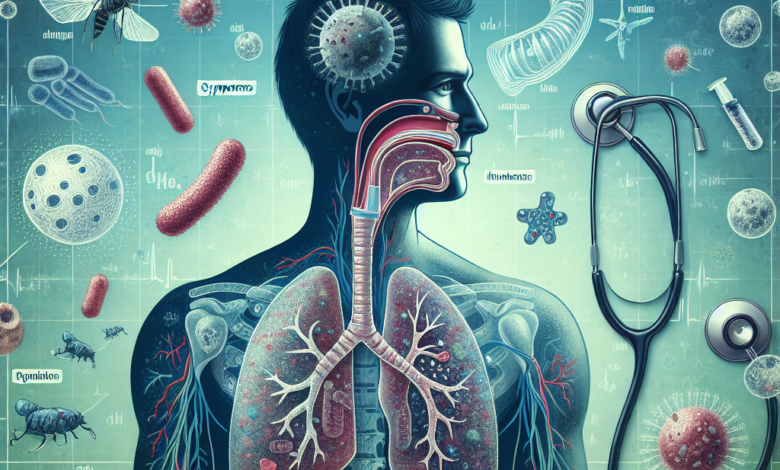Understanding Pneumonia: Symptoms, Causes, and Treatment Options

Pneumonia is an infection that inflames the air sacs in one or both lungs, leading to symptoms that can range from mild to severe. It can affect anyone, but certain groups, such as young children, the elderly, and those with weakened immune systems, are particularly at risk.
Symptoms
Recognizing the symptoms of pneumonia early is crucial for effective treatment. Common symptoms include:
- Cough: This may produce greenish, yellow, or even bloody mucus.
- Fever: Often accompanied by chills and sweating.
- Shortness of Breath: This can occur during rest or physical activity.
- Chest Pain: Typically worsens with deep breathing or coughing.
- Fatigue: A general feeling of weakness or tiredness.
- Nausea or Vomiting: Common in some cases, particularly in children.
Symptoms can vary depending on the cause of pneumonia, the patient’s age, and overall health.
Causes
Pneumonia can be caused by various microorganisms, including:
-
Bacteria: The most common bacterial cause is Streptococcus pneumoniae. Other bacteria, like Mycoplasma pneumoniae and Haemophilus influenzae, can also lead to pneumonia.
-
Viruses: Influenza, respiratory syncytial virus (RSV), and other viruses can cause viral pneumonia, often milder than bacterial pneumonia.
-
Fungi: Fungal infections, although less common, can cause pneumonia, particularly in immunocompromised individuals.
- Aspiration: Inhalation of food, liquid, or vomit into the lungs can lead to aspiration pneumonia.
Risk Factors
Several factors may increase the likelihood of developing pneumonia:
- Age: Children under two and adults over 65 are at higher risk.
- Chronic Diseases: Conditions such as asthma, diabetes, or heart disease can compromise lung function.
- Smoking: Smoking damages lung tissue and can increase susceptibility.
- Immunocompromised State: Conditions like HIV/AIDS or treatments such as chemotherapy weaken the immune system.
Diagnosis
If pneumonia is suspected, healthcare providers may conduct:
- Physical Examination: Listening to breathing with a stethoscope can reveal abnormal lung sounds.
- Chest X-ray: This imaging test identifies areas of the lungs affected by pneumonia.
- Blood Tests: These can help determine the type of infection and assess the body’s response.
- Sputum Sample: Analyzing mucus can help identify the infectious agent.
Treatment Options
Treatment for pneumonia varies based on the cause, severity, and overall health of the patient:
1. Bacterial Pneumonia
Antibiotics are the primary treatment for bacterial pneumonia. The choice of antibiotic depends on the bacteria involved and any existing conditions.
2. Viral Pneumonia
Viral pneumonia typically resolves on its own with rest and supportive care. Antiviral medications may be used in specific cases, such as with influenza-related pneumonia.
3. Fungal Pneumonia
Antifungal medications are needed for fungal pneumonia. Treatment duration varies based on the severity of the infection.
Supportive Treatments
- Rest: Essential for recovery.
- Fluids: Staying hydrated helps thin mucus and makes it easier to cough up.
- Over-the-Counter Medications: Pain relievers and fever reducers can ease symptoms.
Hospitalization
Some patients, particularly older adults or those with severe symptoms, may require hospitalization for intravenous antibiotics, oxygen therapy, or other supportive care.
Prevention
Preventive measures can greatly reduce the risk of pneumonia:
- Vaccination: Vaccines for influenza and pneumococcal diseases can significantly lower the risk.
- Good Hygiene: Regular handwashing can help prevent the spread of infections.
- Avoid Smoking: Quitting smoking improves lung health and reduces pneumonia risk.
Conclusion
Understanding pneumonia—its symptoms, causes, and treatment options—is vital for early recognition and effective management. While many cases of pneumonia can be treated successfully, awareness and timely intervention are key to reducing complications and improving outcomes. If you or someone you know exhibits symptoms of pneumonia, seeking medical attention promptly is crucial.
